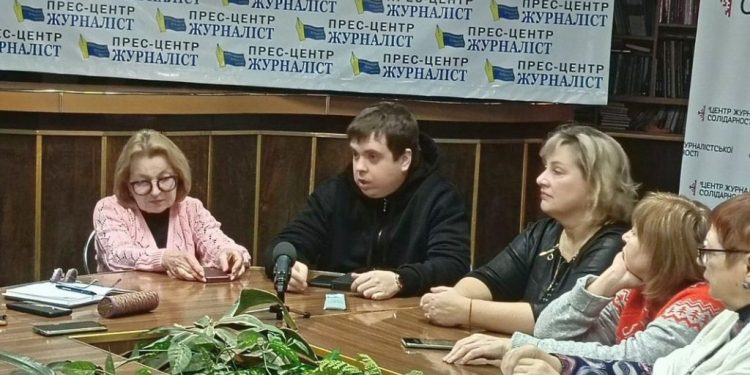To help Ukrainians take care of their internal state and find the strength to overcome emotional devastation, physical tension, anger, fear, and panic is the goal of the All-Ukrainian mental health Program titled How Are You? initiated by the First Lady, Olena Zelenska.
The matter was discussed at a meeting of Zaporizhzhia journalists with the psychologist/regional coordinator of the Program, Serhii Druzhynin, and Deputy Head of the workgroup on mental health of the Coordination Center for the Provision of Assistance to the Civilian Population of the Regional Military Administration/deputy director of the Regional Clinical Institution for the Provision of Psychiatric Assistance, Iryna Kovaliyova. The meeting took place at the Zaporizhzhia Journalists’ Solidarity Center (JSC) of the National Union of Journalists of Ukraine (NUJU).
“The main goal of our meeting with media representatives is to popularize the All-Ukrainian Program and the help it offers, namely, solving problems with the mental health of society, without imposing, but with a willingness to help solve problems at any level, that arose in humans,” says Serhii Druzhynin.
Although Ukrainians surprised the whole world with their resilience, our society was not ready for such large-scale challenges brought by the war. If a person’s quality of life deteriorates due to disorders – insomnia, irritability, burnout, anxiety, depression – they can independently use the algorithms of the Program, self-help offered by the First Aid Kit [Aptechka], placed on the website of How Are You? Therefore, it is possible to find inner strength that will help to get through difficult times.
The First Aid Kit is a guide on stress, which contains useful tips, practical exercises, and techniques for overcoming stress and anxiety, as well as tips on how to develop your own emotional resilience and support loved ones.
But, when a person cannot overcome a negative situation on his own, the Program provides for certain steps of help, which Serhii Druzhynin and Iryna Kovaliyova called a “pyramid.”
Step 1 is to consult a family doctor. Currently, more than 70,000 doctors have completed the online course. They are ready to provide assistance and determine whether drug treatment or addressing a psychotherapist is needed.
Step 2 is to provide free psychological assistance at the community level, where there are coordinators on this issue, in the hubs that have been created in Zaporizhzhia for displaced persons from each occupied district.
Step 3 is when a person has suffered severe psychological trauma; psychiatrists provide drug treatment.
The task of the coordinators of the Program is to prepare the society for interaction and the desire to deal with mental health either on their own or to turn to specialists because the problem must be solved in order to preserve the normal psychological state of the nation.
“Taking care of mental health should become a common responsibility of each of us,” says Olena Mashtaliar, a journalist from the town of Dniprorudne. She currently works on the Zaporizhzhia city channel, MTM. Our compatriots should overcome the prejudice as for the attitude to the psychological service. Advice from a qualified psychologist will help citizens return to normal life.
“A system of services and services that can support a person in various ways and mechanisms should help people, while it is not necessary to provide your personal data, you will not be limited in your rights and professional activities,” says Iryna Kovaliyova.
The topic of mental health and care aroused considerable interest among journalists. During the meeting, a lively discussion began with questions and proposals regarding the possibilities of disseminating important information in society, taking into account the press, radio, and television, and holding seminars and regular meetings with the media people.
Call the Zaporizhzhia JSC at 096 277 5352 (Nataliya Kuzmenko and Valentyna Manzhura, the Zaporizhzhia JSC coordinators). The Center’s address is 152 Sobornyi Avenue.
ABOUT JSC
The Journalists‘ Solidarity Centers is an initiative of the NUJU implemented with the support of the International and European Federations of Journalists and UNESCO. The initiative is designated to help media representatives working in Ukraine during the war. The Centers operate in Kyiv, Lviv, Ivano-Frankivsk, Chernivtsi, Zaporizhzhia, and Dnipro and provide journalists with organizational, technical, legal, psychological, and other types of assistance.
ABOUT UNESCO
UNESCO is the United Nations Educational, Scientific, and Cultural Organization. It contributes to peace and security by promoting international cooperation in education, sciences, culture, communication, and information. UNESCO promotes knowledge sharing and the free flow of ideas to accelerate mutual understanding. It is the coordinator of the UN Action Plan on the Safety of Journalists and the Issue of Impunity, which aims to create a free and safe environment for journalists and media workers, thus strengthening peace, democracy, and sustainable development worldwide. UNESCO is working closely with its partner organizations in Ukraine to provide support to journalists on the ground.
The designations employed and the presentation of material throughout this digest do not imply the expression of any opinion whatsoever on the part of UNESCO concerning the legal status of any country, territory, city, or area or its authorities or concerning the delimitation of its frontiers or boundaries.
The authors are responsible for the choice and the presentation of the facts contained in this digest and for the opinions expressed therein, which are not necessarily those of UNESCO and do not commit to the organization.
Olena Morozova, Nina Derkach
Photo by Dariya Zyrianova

 THE NATIONAL UNION OF
JOURNALISTS OF UKRAINE
THE NATIONAL UNION OF
JOURNALISTS OF UKRAINE
















Discussion about this post